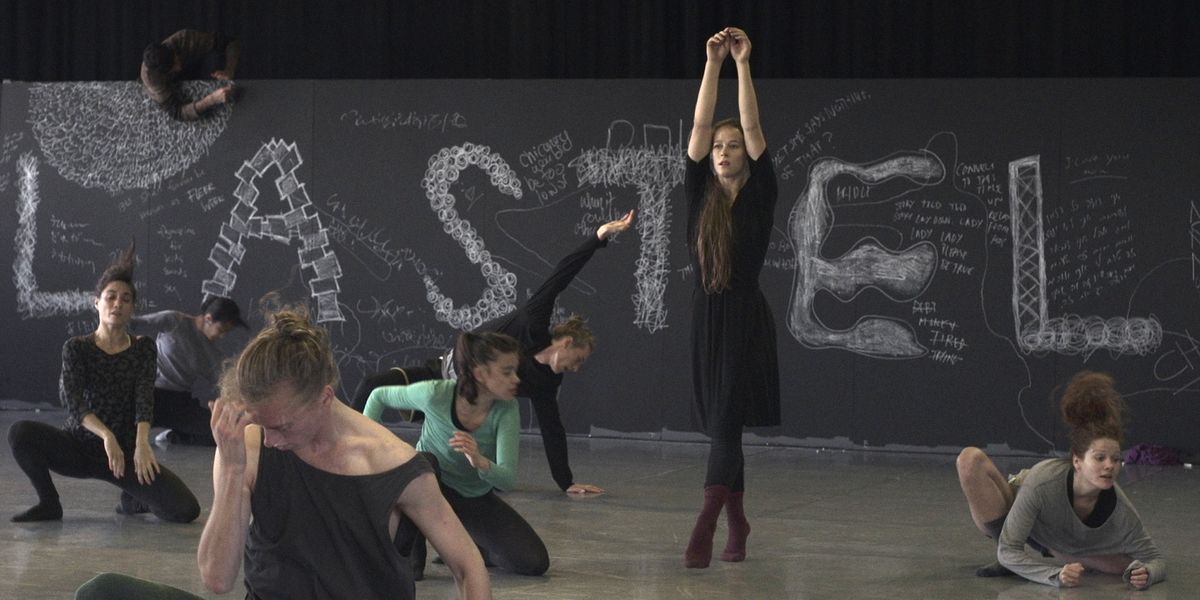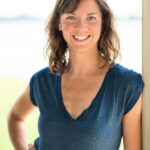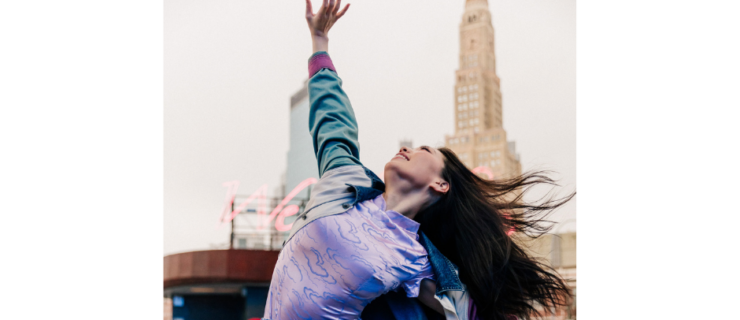Bobbi Jene Smith: What It's Like To Watch Your Life On Film
Elvira Lind’s documentary Bobbi Jene took the 2017 Tribeca Film Festival by surprise last spring, sweeping the awards for Best Documentary, Best Editing and Best Cinematography. For those of us who have watched Batsheva and Bobbi Jene Smith’s career, the film’s success is not unexpected. It is a validation of what we already know: Bobbi Jene is absolutely fascinating.
She is the dance equivalent of a method actor, like a Daniel Day Lewis who lives inside his characters for months or years. Seeing her choreographic process first-hand reveals there is no trying to portray emotion through dance, what we see is true emotion as a result of dance.
[youtube https://www.youtube.com/watch?v=EyKlh18eg-I&t=5s expand=1]
Maybe the real surprises stem from the film’s uncensored portrayal of the dancer’s life beyond the studio. The documentary follows Smith’s decision to leave Batsheva and Tel Aviv after 10 years, to seek out her own choreographic voice, as well as return “home” (identified only as somewhere in the United States.) We see her passionate and later rocky long-distance relationship with fellow Batsheva dancer Or Schrieber, who is 10 years younger, in an up close and personal way. We see her family’s home in Iowa, and the stark contrast between her religious rural roots and her big city artist’s life. As a fly on the wall, we experience viscerally how all these pieces fit together to inspire her work.
The film’s New York City release is September 22, with other cities following shortly. We spoke with Smith about the nitty gritty parts of filming and of life. WARNING: Some spoilers lie ahead!
What have you learned from this documentary experience?
It’s been a lesson on letting go. (Whew!) Elvira looked at my life through her lens, telling the story she wanted.
If you went back in time, would you say yes to the filming process again?
Yes! It’s been powerful to hear responses, especially from women saying the film gave them inspiration and power. That’s huge for me.
What is it like watching your life unfold on a big screen?
I’ve seen it maybe four times. I usually sneak out during screenings because it is difficult. I was shocked the first time I watched it all. There were times I didn’t understand choices made; I was critical sometimes of the dance footage. But Elvira puts so much care and love into every shot. This is her craft, and I owe it to her to trust her decisions.
Watch: An exclusive clip from Bobbi Jene:
It was refreshing how unguarded you were. What was your initial thought behind what to include/not include?
I told Elvira if we are doing this, we go all in. She has a magic ability—when she’s behind the camera she disappears. So most of the stuff that made it into the film, I actually don’t remember her being there! She allows you to just live. The film is also a love story and there’s a whole dance in that, too.
Near the beginning you reveal that you and Ohad were once lovers. Were you worried about opening up personal history?
I was concerned with sharing—I didn’t want the film to become about that. But I trusted Elvira to handle it delicately. Ohad was also able to see the film before it was released. We wanted to make sure he was on board with everything that was shown, since much was filmed at Batsheva.
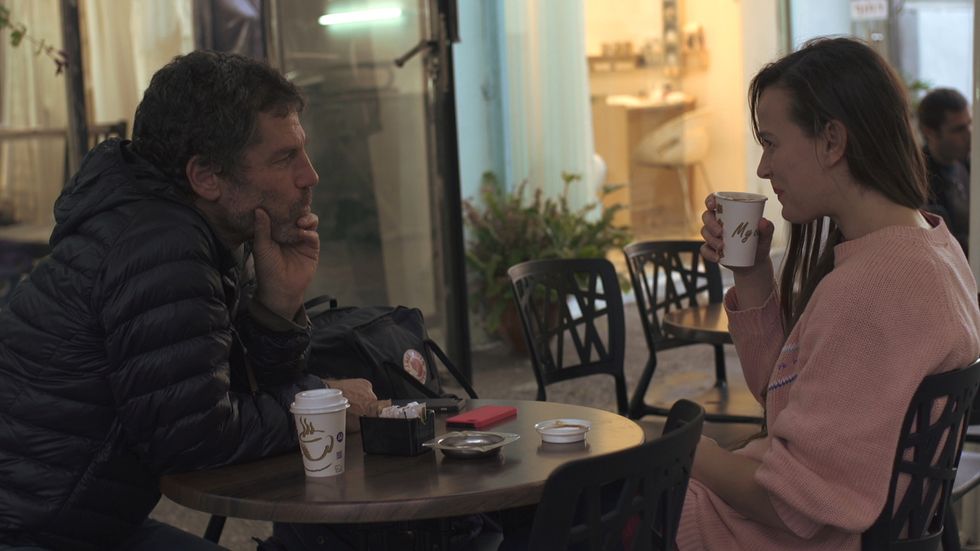
Still from Bobbi Jene
Where did the inspiration for your work
A Study on Effort come from?
The piece came from a curiosity of digging into simple tasks. I began questioning virtuosity and effort. Effort isn’t always connected to burden, sometimes effort is just a sensation that becomes joyous.
What was your mom’s reaction when you told her you were performing the solo nude and pleasuring yourself at the end?
“Oh Bobbi, I just don’t get this!” But my goal is for people to see the physicality of pleasure. Instead of just saying ‘Oh, it’s sexual,’ I wanted to show pleasure is similar or even the same as other physical effort in our lives.
Seeing your mom moved to tears while watching you perform your duet
Harrowing was one of the film’s most touching moments. What did it mean to you?
I felt so lucky to have her there, to share that with her. The fact that she empathized with me really moved me. My work comes from my family too; it shows that you can go far away for so long yet stay connected.
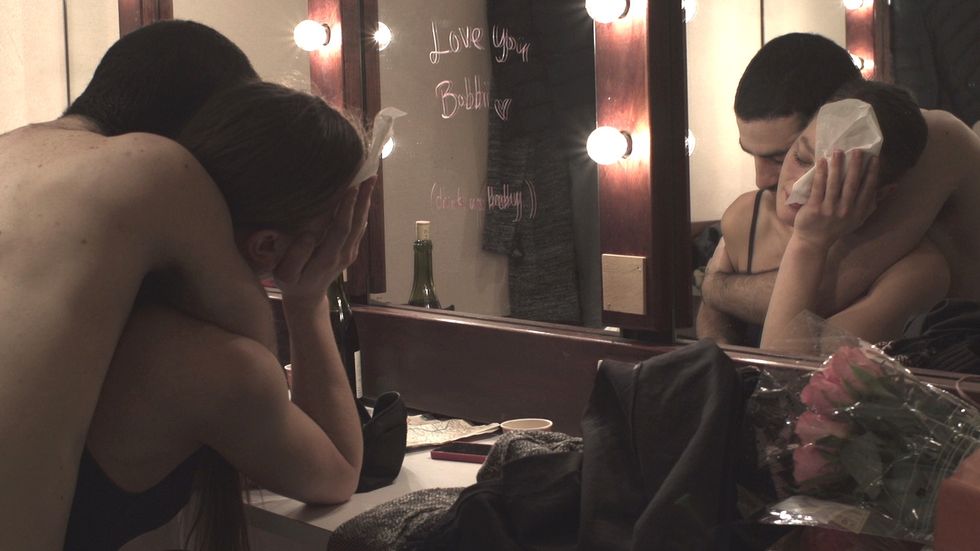
Bobbi Jene Smith and Or Schrieber in Bobbi Jene
How did your family shape you as an artist?
The sense of endless work was always very clear from my parents. That there is no big goal or medal to get to, the virtuosity is in the commitment to your work. This idea was engrained in me. I remember my dad telling my brother and I, “Life’s not boring, you are! Open your eyes and see, look and ask questions!” Religion is obviously a big thing in my family, but dance has become my prayer, a way for me to communicate with the world.
What has happened in your life since we last saw you in the film?
Or and I are both in New York now and still together, and he’s going to acting school! I returned to Batsheva for some performances of Last Work, and for the creative process of Venezuela. I’m continuing work on A Study on Effort, teaching at Juilliard, University of the Arts, San Francisco Conservatory and open classes at Gibney Dance Center and Mark Morris.
How did you and Elvira decide to end filming?
She wanted to keep going, because she didn’t think we had a clear ending yet. I told her if you are waiting for that big moment, it’s probably not going to come!
